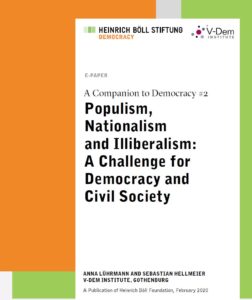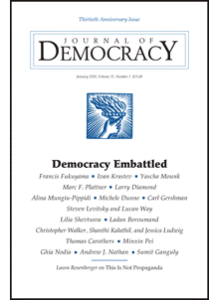
Illiberals are neither fully committed to civil liberties – such as freedom of expression, assembly and association – and the rule of law, nor totally devoted to the institutions that guarantee them, according to V-Dem Institute‘s Anna Lührmann and Sebastian Hellmeier. Both are necessary to ensure that democracy is substantively meaningful and sustainable. Illiberal democracy is hence an oxymoron that democrats should not include in their vocabulary. In the words of the founding co-editor of the influential Journal of Democracy, Marc Plattner (1998), a “profound kinship” exists between liberalism and democracy.
The current autocratisation trend also poses a challenge for democracy promotion strategies and associated theories of change that often still reflect the euphoria of the 1990s, when the main focus was on supporting democratic movements that were already under way. The time has now come to systematically develop democracy promotion strategies that can counteract the global autocratisation trend, they write in Populism, Nationalism and Illiberalism: A Challenge for Democracy and Civil Society, a new report for the Heinrich Boell Stiftung, suggesting three different approaches:
 Firstly, the erosion processes in countries such as Brazil, Poland, Hungary, Turkey, and Venezuela have shown that even countries that were electoral democracies for decades can be affected by autocratisation. Measures to promote democracy should therefore concentrate not only on current transition processes, but also focus more than before on the long-term development of liberal values and institutions.
Firstly, the erosion processes in countries such as Brazil, Poland, Hungary, Turkey, and Venezuela have shown that even countries that were electoral democracies for decades can be affected by autocratisation. Measures to promote democracy should therefore concentrate not only on current transition processes, but also focus more than before on the long-term development of liberal values and institutions.- Secondly, non-state actors such as civil society, the media (traditional and online), and political parties are critical to democracy’s resilience. They should be at the heart of democracy promotion.
- Thirdly, democracy promotion – similar to civil society – should support activities that are not just focused on delegitimising and countering illiberal ideologies and actors but also seek to help depolarise societies…..Depolarisation can be achieved through measures that, first, bring together actors from disparate political camps around one table – e.g. workshops for politicians from different parties – and, second, create joint, cross-factional information channels, for example in social media. RTWT







